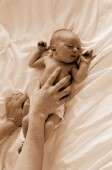Premature infants especially susceptible to ills of cigarette smoke.
(HealthDay)—Babies exposed to cigarette smoke are at increased risk for developing childhood respiratory diseases such as asthma, according to a new study.
Researchers exposed smooth muscle cells from the airways of deceased 18- to 20-week human fetuses to various levels of cigarette smoke. The cells exposed to cigarette smoke showed changes that were similar to the effects of inflammation in asthma.
Even low levels of cigarette smoke caused these changes, while higher levels caused cell death. These changes narrow the airway and make it more difficult for a baby to breathe. The effects would be especially harmful in premature babies, according to the study, which is scheduled for presentation Monday at the annual meeting of the American Society of Anesthesiologists (ASA).
"Due to their highly immature lungs, premature babies often require high levels of additional oxygen in the neonatal intensive care unit, which can put these babies at higher risk for lifelong problems with lung diseases," study author Dr. Elizabeth Vogel, of the department of anesthesiology at the Mayo Clinic in Rochester, Minn., said in an ASA news release.
Exposure to secondhand smoke at home often leads to more respiratory problems and possible return trips to the intensive care unit, she added.
Data and conclusions presented at meetings should be considered preliminary until published in a peer-reviewed medical journal.
More information: The American Academy of Otolaryngology—Head and Neck Surgery has more about secondhand smoke and children.
Copyright © 2012 HealthDay. All rights reserved.



















